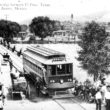 Reviewed: Detroit City Is the Place to Be: The Afterlife of an American Metropolis by Mark Binelli (Metropolitan Books, 336 pp., $28.00). I have no plans to visit North Korea, but there was a time when I longed to see it out of sheer curiosity.
Reviewed: Detroit City Is the Place to Be: The Afterlife of an American Metropolis by Mark Binelli (Metropolitan Books, 336 pp., $28.00). I have no plans to visit North Korea, but there was a time when I longed to see it out of sheer curiosity.
Then I read cartoonist Guy Delisle’s graphic travel memoir Pyongyang, and my desire to go was satisfied. To read the book felt as close to a submersion in the country’s unique weirdness as one could hope for, short of setting foot there. Delisle’s description was that good.
So is Mark Binelli’s Detroit City is the Place to Be: The Afterlife of an American Metropolis. In decline for decades, Detroit has begun to attract farmers, idealists, and creative types, generating legend upon legend while remaining one of the most dangerous cities in the nation. It’s two hours down I-75 from my childhood hometown, but in the Devil’s Night ’80s, I was likelier to visit Pyongyang. Detroit is such a storied place that I expected the Rolling Stone journalist’s book to be worth reading even if it turned out to be just a series of dispatches.
It’s so much more than that. Binelli moves to Detroit and talks to Detroiters, examines the city’s flesh and bones, cycles past ruins and urban prairies. What he sees is, predictably, shocking. Yet he avoids “ruin porn” and pat explanations of Detroit’s troubles, many of which are as racist as they are myopic. Instead, Binelli asks questions. “What happens to a once-great place after it has been used up and discarded?” he wants to know. “Who sticks around and tries to make things work again?”
Who, indeed? Students at a concealed-carry class who have come to expect break-ins. A union boss with a grim insider’s view of the auto industry’s “comeback.” A city council candidate who touts having undergone foreclosure proceedings as a qualification for office. African-Americans who weren’t very sorry to see whites leave for the suburbs. The mother of a murderer. The descendant of a French voyageur. Hipsters, artists, and the guys who invented techno.
Our guide is well-qualified. The son of Italian immigrants, Binelli grew up in a blue-collar town just outside the city limits, where he and his friends relished pop-culture evidence of how Detroit had come to stand for badassery and dystopia. Well-versed in city history, he disabuses us of the notion that Detroit’s downfall began with its 1967 riot—or uprising, as many black residents refer to it—when in truth economic troubles and white flight had begun years before.
The book benefits from Binelli’s sense of the mythic; he reflects often on the city’s symbolic power and the psychology of our reactions to it. Detroit’s meteoric rise and fall, he writes, “possesses the sort of narrative arc to which people seem hardwired to respond.” He notes that the city has become “a grim national punch line….the very word Detroit threatening to turn into one of those place-names that no longer immediately signifies place but rather, like Pompeii, Hiroshima, or Dresden, the traumatic end of one.” He points out our schadenfreude but stops short of condemning it.
Binelli is interested in the idea that the city’s afterlife is in some sense cutting-edge. In a country where the middle class is ailing and joblessness is the new normal, where people are turning to DIY projects as much out of necessity as of enjoyment, Detroiters are downright avant-garde. When they lose their jobs, they step up “hustles” like promoting concerts and selling T-shirts. They “tauten the civic slack” themselves, forming vigilante demolition squads, rounding up stray dogs, planting produce, and policing their own neighborhoods. The current national malaise, Binelli writes, makes Detroit “feel less like a crazy anomaly and more like a leading indicator…. Detroit, in the end, might reclaim its old title after all—not the Motor City but the city of tomorrow.” If Detroit is a beacon for our times, a laboratory of the future, then it’s no wonder so many people feel drawn to the place. Many go to gawk. Some of them stay.
Jenny Blair is a writer, editor, and MD; her website is www.jennyblair.com.






0 Comments